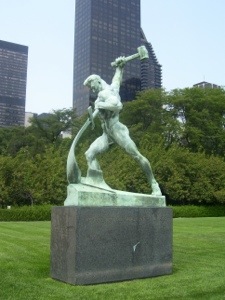 “Returning violence for violence multiplies violence, adding deeper darkness to a night already devoid of stars. Darkness cannot drive out darkness: only light can do that. Hate cannot drive out hate: only love can do that.” Martin Luther King
“Returning violence for violence multiplies violence, adding deeper darkness to a night already devoid of stars. Darkness cannot drive out darkness: only light can do that. Hate cannot drive out hate: only love can do that.” Martin Luther King
Sitting on a mountainside one day, Jesus wove a story of love for enemies and turning the other cheek, a picture of a world dominated not by the sword of Rome but the love of God, a vision that engages with two ancient prophets who saw swords beaten into ploughshares.
It’s easy to get caught up in the majesty of this vision and not think about the implications. There’s an obvious contrast between war, which brings death, and agriculture that produces life, the warrior and the farmer, but let’s not stop at imagery and metaphor. There’s a practicality to this message.
The current budget of the British Armed forces is £37.5 billion; in 2012, the military budget of the US was around a trillion dollars. Isaiah’s vision effectively sees all this pumped into feeding people; Micah’s messianic world completely rewrites the economic rule book. And yes, this is a future age, not tied to the structures and brokenness of our world, but what if we prayed till our knees bled that we’d see just a taste of this, a foreshadowing, instead of school shootings and wars? Is it possible that, despite the visions, despite the commands of Christ, we don’t really believe that such a world is possible?
“Swords into ploughshares.” It’s a phrase that shatters one of our most ancient idolatries. In Isaiah 31, he warns us not to put our trust in chariots horses, in Predator Drones or aircraft carriers. We think they make us strong, but let’s not kid ourselves, their power pulls us away from the Lord; it becomes easier to trust in our arsenal and not in our God. We’re called to take our idols and turn them into something more productive. We’re called to take our resources and use them as a blessing, not as tools of intimidation, fear, violence, anger. And that’s way bigger and more spiritually demanding than just the percentage of our taxes that goes on defence or the money a shooting fan may spend on their hobby.
This demands a change of heart; it’s not just about an absence of weapons, it’s about an absence of the desire to use them. And maybe that’ll be easy to achieve in the future messianic age, but achieving it now, in a society that seemingly loves to turn us against each other? That’s when we see the true power of this idea.
Today is Martin Luther King Day, on which we celebrate a man faced with a choice – to lead a revolution open to the idea of violence, or to inspire a movement driven by love and non-violence. Given how African-Americans were oppressed in the sixties, it would have been simple to do the former; instead he chose the latter and created a legacy of non-violence that persists to this day. King was rooted in these biblical ideas, with his own dream of mountains, unity and peace.
It’s a dream of wholeness and shalom, living in a fundamental, divine state of grace. And in the now-and-not-yet Kingdom of God, Christ’s call to turn the other cheek tells us to live like this now, in a world where conflict is real and recourse to weapons – words, guns, ‘God Hates Fags’ banners – is still an instinctive reaction. What if we took all the effort and resources we put into those weapons, into all that spitting hatred, and used it to feed our ‘enemies’ instead, to invite them to a banquet? To take seriously the words of Jesus and actually love our enemies, both real and imagined?
There’s a beautiful article over at SheLoves about a woman who has seen the power of taking this literally; today we celebrate a man who did this too, even under a starless sky. Dare we take these example’s of Christ’s love in action and use them to look at our weapons, to see how we can transform them into tools of radical blessing? Maybe that’s why the farming metaphor is so potent; tied up with ideas about the healing and restoration of the world, it invites us to share its produce with those around us, mending communities and forging fellowship as we do.
One future day, when war and death are broken, swords will be beaten into ploughshares. Let’s be revolutionary and begin this transformation today.
Update: It turns out that someone has coined a name for a gun that’s been transformed into a guitar – Escopetarra. Invented by Columbian peace activist Cesar Lopez, there’s a video of his work over at Cultures of Resistance.





